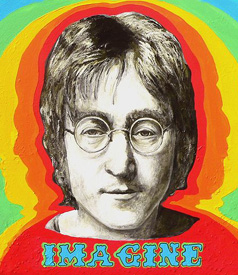Did you know that Truthout is a nonprofit and independently funded by readers like you? If you value what we do, please support our work with a donation.
Three decades after John Lennon’s death, the world continues to mourn the loss of a musical genius and one of the strongest voices for global peace.
Lennon would have been 70 years old this Saturday, had his life not been tragically cut short when he was shot to death on Dec. 8, 1980, almost two months after turning 40 years old, by a deranged fan outside his New York apartment building.
Since his death, the legacy he created as a member of The Beatles and through his activism has kept him in the public eye.
Perhaps his best-known song, “Imagine,” calls for us to consider a world without “heaven”, or countries, and the possibilities this creates for “a brotherhood of man.”
“It isn’t hard to do. Nothing to kill or die for. And no religion too,” sings Lennon. “Imagine all the people. Living life in peace.”
Through his music with one of the most important rock bands of the twentieth century, in his solo work and in collaboration with Yoko Ono, Lennon challenged a nation over its militarism, considered the highs and lows of love, and simply made people dance.
His status as a cultural icon was confirmed on the 70th anniversary of his birthday – people around the world celebrated his birthday and Google UK ran an interactive doodle on its web page in Lennon’s honor.
A 2009 movie about his adolescence and musical beginnings, Nowhere Boy, is scheduled to be released to coincide with the anniversary and a benefit concert in Lennon’s name will be held in New York City on Nov. 12. The proceeds will go to the Playing for Change Foundation, which promotes peace using music.
Eight of his albums have also been re-mastered and are being released this week as two box sets, along with a remixed version of his 1980 “Double Fantasy” album with Yoko Ono.
Ono, Lennon’s wife, musical collaborator and fellow activist, will spend the anniversary of his birthday in Iceland, celebrating with a concert by her Plastic Ono Band, and lighting the Imagine Peace Tower in Lennon’s honor.
Ono spoke to AP about what Lennon’s take on the state of the world today would have been:
“He would have been totally angry. … He would have felt like he wanted to run somewhere and just bang something or strangle someone, you know?,” said Ono. “But then I think, I’m sure he would have relaxed and decided he should still be an activist. We need to really do something about the world. Otherwise, we’re all going to blow up together.”
Press freedom is under attack
As Trump cracks down on political speech, independent media is increasingly necessary.
Truthout produces reporting you won’t see in the mainstream: journalism from the frontlines of global conflict, interviews with grassroots movement leaders, high-quality legal analysis and more.
Our work is possible thanks to reader support. Help Truthout catalyze change and social justice — make a tax-deductible monthly or one-time donation today.
